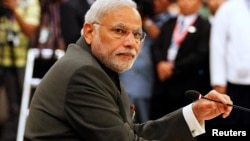Indian Prime Minister Narendra Modi will not have to face a U.S. lawsuit claiming he failed to stop anti-Muslim rioting in 2002, a federal judge in New York ruled on Wednesday.
U.S. District Judge Analisa Torres upheld the U.S. Department of State's determination that Modi is entitled to immunity as a sitting head of government from civil lawsuits filed in U.S. courts.
The lawsuit, filed in September by an obscure human rights group on the eve of Modi's maiden visit to the United States, made international headlines at the time, though officials from both countries brushed it off as a distraction.
Joseph Whittington, the president of the human rights group American Justice Center and a city council member in Harvey, Illinois, acknowledged in September that the case had little chance of succeeding but said there was victory in "symbolism."
Babak Pourtavoosi, a lawyer who represented the center, and Whittington did not immediately respond to requests for comment.
The judge's decision comes ahead of a planned visit by President Barack Obama to attend India's January 26 Republic Day celebrations at Modi's invitation.
The lawsuit claimed Modi, a Hindu nationalist, did nothing to halt riots in his home state of Gujarat in which more than 1,000 people died in reprisals after a train carrying Hindu pilgrims was set on fire.
As a result of the allegations, Modi was denied a U.S. visa in 2005, but Obama was quick to invite him to the United States after Modi's election as prime minister.
The September visit was intended to revitalize the two countries' relationship, which was severely strained in 2013 when U.S. authorities in New York arrested an Indian diplomat, Devyani Khobragade, for underpaying a domestic worker and subjected her to a strip search. The State Department later granted her immunity and essentially had her expelled in a series of diplomatic maneuvers.
Whittington said last fall that some of his constituents in Illinois were refugees from the Gujarat violence, prompting him to take action against Modi.
The State Department did not immediately comment on the ruling. A spokesperson for Modi could not immediately be reached outside of business hours in India, and the Indian embassy in Washington did not respond to a request for comment.





